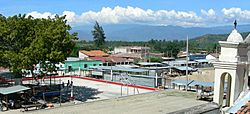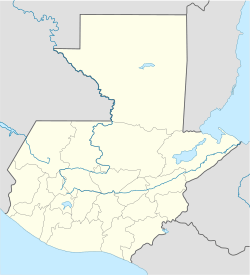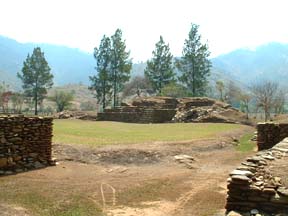Canillá facts for kids
Quick facts for kids
Canillá
|
|
|---|---|
|
Municipality
|
|

Canillá's central plaza in 2006
|
|
| Country | |
| Department | |
| Municipality | Canillá |
| Government | |
| • Type | Municipal |
| Area | |
| • Municipality | 123 km2 (47 sq mi) |
| Elevation | 1,300 m (4,300 ft) |
| Population
(Health Center Annual Report 2013)
|
|
| • Municipality | 15,053 |
| • Urban | 2,198 |
| • Ethnicities | Kʼicheʼ Ladino |
| • Religions | Roman Catholicism Evangelicalism Maya |
| Climate | Am |
| Website | http://www.inforpressca.com/canilla/ |
Canillá is a small town and municipality in Guatemala. It is located in the El Quiché department. The area of Canillá is about 123 square kilometers (47 square miles). Around 15,000 people live there.
In Canillá, people speak Spanish or Kʼicheʼ. Kʼicheʼ is a special language from the Maya people. Some people speak both languages. The main religions in Canillá are Catholic and Evangelical faiths.
Contents
Canillá's Past: A Look at Its History
Ancient Times: Before the Spanish Arrived
Long ago, a family called the aj Kʼubʼul left their home. They were looking for a peaceful place with good land. The Kʼicheʼ king was worried. He sent soldiers to watch them. The king feared the aj Kʼubʼul might join other groups and fight against him.
The soldiers settled near the aj Kʼubʼul family. They soon saw that the aj Kʼubʼul were very peaceful. They just worked on their farms and enjoyed their families. The soldiers told the Kʼicheʼ king not to worry.
Over time, the Kʼicheʼ warriors saw how different life was for the aj Kʼubʼul. They didn't have to fight wars. So, the warriors went back to their old home, Tujalj (near Sacapulas and Canillá). They brought their families and moved to where they had watched the aj Kʼubʼul. This became a new, peaceful community.
After the Spanish Conquest
After the Spanish came to Guatemala in the 1500s, Canillá was not often mentioned. In the 1700s, a church leader named Pedro Cortés y Larraz wrote about it. He called it a "ranch" in 1768. This means it was not a big town yet. He also noted the dry land and deep valleys. This is because Canillá is in the Sierra de Chuacús mountains.
Canillá After Guatemala's Independence
In 1872, the El Quiché Department was created. Canillá was mentioned as a town in this new department.
By 1880, a census showed Canillá was part of San Andrés Sajcabajá. It had 607 people. Most of them worked in farming. There were no big industries there.
Canillá became its own municipality in 1893. This was made official by President José María Reina Barrios. But later, in 1936, President Jorge Ubico changed it back. Canillá became part of San Andrés Sajcabajá again.
Years later, in 1951, President Jacobo Árbenz Guzmán made Canillá a municipality once more.
In the 1970s, Canillá grew. A new school with six classrooms was built in 1970. A health center also opened. It started selling medicines in 1973.
How People Make a Living in Canillá
Canillá is a quiet town. Most people here are subsistence farmers. This means they grow food mainly for themselves and their families. They grow crops like corn, platanos, and other tropical fruits and vegetables.
The small main part of Canillá has the town offices, a library, and a post office. There are also stores where you can find telephone services. Some people make bricks as a local industry.
The roads connecting Canillá to other towns like San Andrés Sajcabajá and Santa Cruz del Quiché are not paved. They can be rough, especially when it rains. This makes it hard for people to sell their crops in bigger markets.
Because there are not many jobs in Canillá, many people travel for work. They go to other parts of Guatemala. Some even go to Mexico or the United States. For example, a group from Canillá works in Tuscarawas County, Ohio.
Ancient Maya Ruins: "Los Cerritos"
Outside Canillá, near a village called Chijoj, you can find ancient Maya ruins. People call them "Los Cerritos," which means "Little Hills" in Spanish.
These ruins show old patterns of pyramids, squares, and rectangles. There's a large sports field where the Maya people used to play games. It looks a bit like a big swimming pool. If the weather is good, you can follow the road from Canillá to Chijoj to reach these ruins.
Where is Canillá Located?
 |
Uspantán, a town in El Quiché |  |
||
| San Andrés Sajcabajá, a town in El Quiché Department | Cubulco, a town in Baja Verapaz Department | |||
| Joyabaj and Zacualpa, towns in El Quiché Department |
See also
 In Spanish: Canillá para niños
In Spanish: Canillá para niños
 | May Edward Chinn |
 | Rebecca Cole |
 | Alexa Canady |
 | Dorothy Lavinia Brown |



